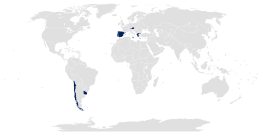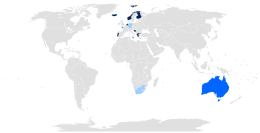Intersex rights in Republic of India
| Intersex rights in Republic of India | |
|---|---|
 Area controlled by India shown in dark green; claimed but uncontrolled regions shown in light green. | |
| Protection of physical integrity and bodily autonomy | No |
| Protection from discrimination | No |
| Intersex topics |
|---|
 |
Intersex people in Republic of India are formally recognised under a protected third gender category called Hijra along with eunuchs and transgenders.[1]
History[edit]
Intersex issues in India may often be perceived as third sex issues. The most well-known third-gender group in India is perhaps the hijra of northern India. After interviewing and studying the hijra for many years, Serena Nanda writes in her book, Neither Man Nor Woman: The hijras of India, as follows: "There is a widespread belief in India that hijras are born hermaphrodites [intersex] and are taken away by the hijra community at birth or in childhood, but I found no evidence to support this belief among the hijras I met, all of whom joined the community voluntarily, often in their teens."[2]
Physical integrity and bodily autonomy[edit]

Intersex persons are not protected from violations to physical integrity and bodily autonomy.
Cases of infanticide have been reported involving infants with obvious intersex conditions at birth, along with a failure to thrive by infants assigned female.[3] Medical reports suggest that parents in India prefer to assign infants with intersex conditions as male, with surgical interventions taking place when parents can afford them.[4][5][6]
In a reply to a letter from an intersex rights activist Gopi Shankar Madurai, the Ministry of Health and Family Welfare, India replied that “Any kind of invasive medical procedure including sex reassignment surgeries are done only after thorough assessment of the patient, obtaining justification for the procedure planned to be conducted with the help of appropriate diagnostic test and only after taking a written consent of the patient/guardian”.[7]
Protection from discrimination[edit]

India does not have specific laws protecting intersex people from discrimination.[citation needed]
Multiple Indian athletes have been subjected to humiliation, discrimination and loss of work and medals following sex verification.[8] Middle-distance runner Santhi Soundarajan, who won the silver medal in 800 m at the 2006 Asian Games in Doha, Qatar, was stripped of her medal[9] and later attempted suicide.[10][11] Track athlete Pinki Pramanik was accused by a female roommate of rape and later charged, gender tested and declared male, though she and other medical experts dispute these claims.[12] Such testing is controversial: Indian athlete Dutee Chand won a case against the IAAF in 2015, enabling women athletes with high testosterone levels to compete as women, on the basis that there is no clear evidence of performance benefits.[13] In 2016, sports clinicians Genel, Simpson and de la Chapelle stated, "One of the fundamental recommendations published almost 25 years ago ... that athletes born with a disorder of sex development and raised as females be allowed to compete as women remains appropriate".[14]
Identification documents[edit]
For people who need to change gender, the case of National Legal Services Authority v. Union of India allows this by self determination.[15] Actions in 2015 by gender rights organization Srishti Madurai seek to include intersex people in legislation on gender recognition for transgender people.[16]
Rights advocacy[edit]
Gopi Shankar Madurai was one of the youngest[17] candidates, and the first openly intersex and genderqueer candidate to contest an election, in the Tamil Nadu Legislative Assembly election, 2016.[18][19][20][21]
See also[edit]
- Intersex human rights
- LGBT rights in Republic of India
- Hijra (South Asia)
- Human rights in Republic of India
References[edit]
- ↑ CultureShock! India, Lynelle Seow, Marshall Cavendish International Asia Pte Ltd, 2017, p.132
- ↑ Nanda, Serena. Neither Man Nor Woman: The hijras of India, p. xx. Canada: Wadworth Publishing Company, 1999
- ↑ Warne, Garry L.; Raza, Jamal (September 2008). "Disorders of sex development (DSDs), their presentation and management in different cultures". Reviews in Endocrine and Metabolic Disorders. 9 (3): 227–236. doi:10.1007/s11154-008-9084-2. ISSN 1389-9155. PMID 18633712.
- ↑ Rajendran, R; Hariharan, S (1995). "Profile of Intersex Children in South India". Indian Pediatrics. 32.
- ↑ Sharma, Radha (February 5, 2014). "Parents prefer male child in intersex operations in Gujarat". Times of India.
- ↑ Gupta, Devendra; Sharma, Shilpa (2012). "Male genitoplasty for 46 XX congenital adrenal hyperplasia patients presenting late and reared as males". Indian Journal of Endocrinology and Metabolism. 16 (6): 935. doi:10.4103/2230-8210.102994. ISSN 2230-8210.
- ↑ Karthikeyan, Ragamalika (February 3, 2017). "Activists say surgical 'correction' of intersex babies at birth wrong, govt doesn't listen". The News Minute.
- ↑ Kalra, Sanjay; Kulshreshtha, Bindu; Unnikrishnan, Ambika Gopalakrishnan (2012). "We care for intersex: For Pinky, for Santhi, and for Anamika". Indian Journal of Endocrinology and Metabolism. 16 (6): 873. doi:10.4103/2230-8210.102980. ISSN 2230-8210.
- ↑ "Indian silver medalist female runner at Asian Games fails gender test". International Herald Tribune. 18 December 2006.
- ↑ "Indian runner fails gender test, loses medal". Sports.espn.go.com. 2006-12-18. Retrieved 2016-08-02.
- ↑ "Shanti fails Doha gender test". The Telegraph. Calcutta, India. 18 December 2006.
- ↑ "Medical experts doubt Pinki Pramanik can rape". Times of India. 14 November 2012. Retrieved 15 November 2012.
- ↑ Court of Arbitration for Sport (July 2015). "CAS 2014/A/3759 Dutee Chand v. Athletics Federation of India (AFI) & The International Association of Athletics Federations (IAAF)" (PDF). Court of Arbitration for Sport.
- ↑ Genel M; Simpson J; de la Chapelle A (August 4, 2016). "The olympic games and athletic sex assignment". JAMA. 316: 1359. doi:10.1001/jama.2016.11850. ISSN 0098-7484.
- ↑ Lawyers Collective. "Supreme Court recognises the right to determine and express one's gender; grants legal status to 'third gender'".
- ↑ McCormick, Joseph Patrick (August 29, 2015). "India urged to include intersex people in bill protecting trans rights". Pink News.
- ↑ "Intersex person to contest from Madurai North". 30 April 2016 – via The Hindu.
- ↑ "3rd gender gets a new champion in Tamil Nadu poll ring – Times of India".
- ↑ "Meet and Understand The First Genderqueer Candidate in Indian Politics". bodahub.com. Retrieved 2017-05-12.
- ↑ "Intersex candidate alleges harassment – Times of India".
- ↑ "This intersex person is contesting TN polls, 'ze' wants to change your mind on sexual minorities - The News Minute". 24 April 2016.
Bibliography[edit]
- Asia Pacific Forum of National Human Rights Institutions (June 2016). Promoting and Protecting Human Rights in relation to Sexual Orientation, Gender Identity and Sex Characteristics. ISBN 978-0-9942513-7-4. Search this book on

- ""Inter-sex people are not transgenders" - The Hindu". thehindu.com. Retrieved 2017-05-19.
- ""Why intersex folks need recognition" - The Times Of India". The Times Of India. Retrieved 2017-08-27.
This article "Intersex rights in Republic of India" is from Wikipedia. The list of its authors can be seen in its historical. Articles copied from Draft Namespace on Wikipedia could be seen on the Draft Namespace of Wikipedia and not main one.
